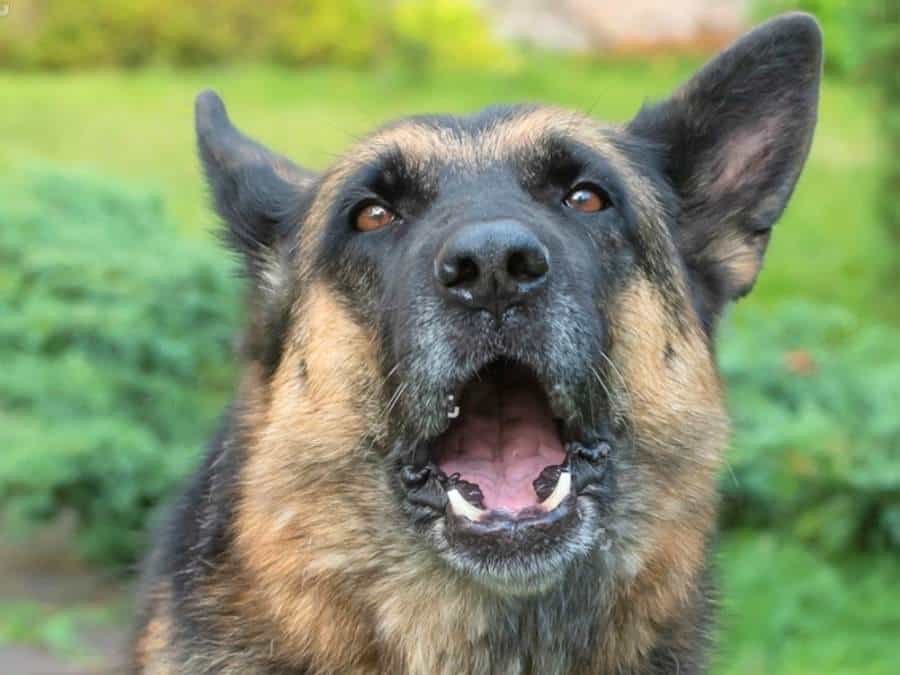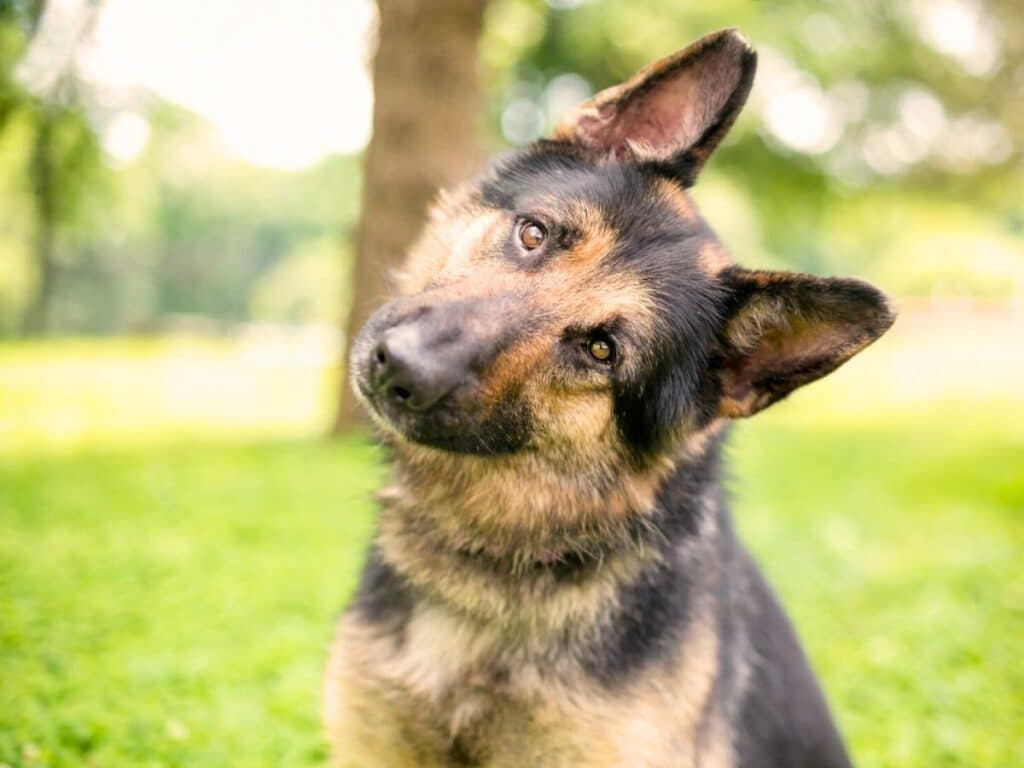Wondering why are German Shepherds so dramatic? Well, your German Shepherd’s dramatic tendencies aren’t just for show – understanding the reasons behind their theatrics can help you better manage their behavior.
So in today’s article, I will give you 11 reasons why your German Shepherd is so dramatic and I will also give you a few practical tips that can help you manage your GSD’s dramatic behavior.
Let’s dive in!
Why Are German Shepherds So Dramatic?
German Shepherds are often described as “dramatic” due to their expressive nature and tendency to exhibit intense behaviors.
Here are 11 reasons why GSDs behave so dramatically:
- When they are scared or anxious.
- When they are in an unfamiliar environment.
- If they have not been properly socialized.
- They may be stressed due to lack of exercise.
- Due to their protective instincts.
- Due to their high energy levels.
- They may be bored.
- They may be seeking attention.
- They may be in pain.
- It could be their intelligence and problem-solving abilities.
- It’s in their genes to be dramatic.
Now let’s discuss why are German Shepherds so dramatic in a bit more detail.

1. When they are scared or anxious.
German Shepherds can be prone to fear and anxiety, which can cause them to behave dramatically in certain situations. Whether it’s loud noises, unfamiliar people, or new environments, these dogs may react by barking excessively, growling, or even hiding.
It’s important for owners to understand their dog’s triggers and work on desensitizing them through positive reinforcement training.
2. When they are in an unfamiliar environment.
When a German Shepherd is placed in an unfamiliar environment, they may become overwhelmed and exhibit dramatic behavior. This could include pacing, excessive barking, or even aggression towards other animals or people.
Proper socialization from a young age can help reduce these reactions and make them more comfortable in different surroundings.
3. If they have not been properly socialized.
A lack of socialization during the early stages of a German Shepherd’s life can contribute to their dramatic behavior. Without exposure to different people, animals, and environments, they may struggle to adapt when faced with new situations later on.
Ensuring your German Shepherd has plenty of positive experiences with various stimuli can help prevent dramatic behavior.
4. They may be stressed due to lack of exercise.
German Shepherds are intelligent and active dogs that require both physical exercise and mental stimulation to thrive. When they don’t receive enough of either, they may become stressed and resort to dramatic behaviors as a way to release pent-up energy or frustration.
Regular exercise routines and engaging activities such as puzzle toys can help alleviate this stress.
5. It’s their protective instincts.
Due to their protective nature, German Shepherds may sometimes mistake harmless objects or situations for potential threats. This misinterpretation can lead them to behave dramatically by barking aggressively or lunging towards perceived dangers.
Training sessions focused on obedience commands and impulse control can help them differentiate between real threats and harmless situations.
6. Due to their high energy levels.
German Shepherds are known for their high energy levels, and when they become overly excited or hyperactive, their behavior can become quite dramatic. This may include excessive barking, jumping, or even zooming around the house.
Regular exercise and mental enrichment activities are crucial in channeling their energy in a positive way.
RELATED: German Shepherd Behavior: Their Strange Quirks Explained

7. When they are simply bored.
When German Shepherds don’t have enough mental or physical stimulation, they can quickly become bored. This boredom often leads to dramatic behavior as a means of seeking attention or entertainment.
Providing them with interactive toys, training sessions, and daily playtime can help keep their minds engaged and prevent boredom-induced drama.
8. When they are seeking attention.
German Shepherds are highly intelligent dogs that thrive on human interaction and attention. If they feel neglected or ignored by their owners, they may resort to dramatic behaviors as a way to regain attention.
It’s important for owners to spend quality time with their German Shepherds through regular walks, training sessions, and positive reinforcement techniques.
9. Certain health conditions or pain can manifest as dramatic behavior.
Dramatic behavior in German Shepherds could also be an indication of underlying pain, illness, or injury. Dogs often exhibit exaggerated responses when they’re feeling unwell as a way to communicate distress to their owners.
If you notice sudden changes in your German Shepherd’s behavior accompanied by signs of discomfort such as limping or loss of appetite, it’s essential to consult with a veterinarian for proper diagnosis and treatment.
10. It’s their intelligence and problem-solving abilities.
German Shepherds are highly intelligent dogs known for their problem-solving abilities. This intelligence can contribute to their dramatic behavior by allowing them to come up with creative ways to express themselves.
They may use various tactics such as excessive whining, jumping, or even staging “dramatic” scenes to capture attention or communicate their needs.
11. It’s in their genes to be dramatic.
Lastly, it’s worth noting that genetics play a role in the temperament of German Shepherds. Some individuals within this breed may have a predisposition towards more dramatic behavior due to genetic factors.
While training and socialization can help manage these tendencies, it’s important to understand that certain personality traits may be inherent in the breed.
Discover the secret to a calm, obedient, and fuss-free furry companion with the Brain Training For Dogs Course. Say goodbye to doggie tantrums and hello to harmony!
How To Stop a German Shepherd From Being Dramatic?
If you’re dealing with a German Shepherd who tends to be overly dramatic, there are a few strategies you can try to help alleviate this behavior.
1. Provide regular exercise
Ensure your German Shepherd gets enough physical exercise every day. Engage them in activities like brisk walks, jogging, fetch, or playtime in a fenced yard. Sufficient exercise can help channel their energy in positive ways and reduce restlessness.

2. Don’t neglect mental stimulation
Keep your dog mentally engaged with interactive toys, puzzle feeders, and training sessions. Mental stimulation can tire them out and prevent boredom, which often leads to dramatic behavior.
3. Positive reinforcement training
Use positive reinforcement techniques to reward good behavior and ignore or redirect unwanted dramatic behavior. Reward-based training helps build a strong bond with your dog and encourages them to repeat desirable actions.
4. Socialize your GSD
Introduce your German Shepherd to different people, animals, and environments during their puppy stage and beyond. Proper socialization can help them become more confident and less prone to dramatic reactions in new situations.
5. Follow a consistent routine
Stick to a consistent daily routine for feeding, exercise, playtime, and rest. Dogs, including German Shepherds, thrive on predictability and structure.
6. Address separation anxiety issues
If your German Shepherd experiences separation anxiety, gradually accustom them to being alone for short periods and provide comforting toys or treats. Consult a professional if the anxiety is severe.
RELATED: How I Fixed My German Shepherd’s Separation Anxiety
7. Identify triggers and desensitize your dog
If your dog is sensitive to specific triggers, work on desensitizing them through gradual exposure. For example, if they react dramatically to loud noises, start by playing low-level sounds and gradually increase the volume over time.
8. Seek professional help
If your German Shepherd’s dramatic behavior persists or becomes problematic, consider consulting a certified dog trainer or behaviorist. They can assess your dog’s behavior, provide personalized guidance, and develop a training plan to address specific issues.
9. Avoid punishment
Avoid using punishment-based training methods, as they can exacerbate fear and anxiety in your dog, leading to more dramatic behavior.
10. Provide safe space for your dog
Create a safe and comfortable space for your German Shepherd to retreat to when they feel overwhelmed or stressed. Having a designated area where they can relax can help them cope with challenging situations.
Remember that patience, consistency, and positive reinforcement are key to modifying behavior in any dog.
RELATED: Why Are German Shepherds So Clingy?

What Are The Triggers For Dramatic Behavior in GSDs?
The triggers for dramatic behavior in German Shepherds can vary from one dog to another, but some common triggers may include:
1. Loud noises
These dogs have highly sensitive hearing and can be easily startled by loud sounds such as thunderstorms, fireworks, or even a dropped object. When faced with these unexpected noises, German Shepherds may react dramatically by barking excessively, whining loudly, or even hiding in fear.
2. Unfamiliar environments
These intelligent dogs thrive on routine and familiarity. When placed in a new environment where everything is different and unknown to them, they may become anxious and display dramatic behaviors as a way to cope with their discomfort.
3. Sudden change
Also, any deviation from their usual routine can cause them to feel unsettled and seek attention through dramatic behavior.
4. Lack of routine and structure
Without a set schedule to follow or clear boundaries established by their owners, these dogs may resort to seeking attention through drama.
When they don’t receive enough attention or engagement from their owners due to a lack of structure in their daily lives, they may resort to dramatic behaviors as a way of demanding attention.
5. Poorly managed interactions with people/animals
Interactions with other animals or humans that are poorly managed can also trigger heightened drama in German Shepherds.
These dogs are naturally protective and can be wary of strangers or unfamiliar animals. If not properly socialized from an early age, they may exhibit dramatic behaviors when faced with new people or pets.
6. Separation anxiety triggers
These dogs form strong bonds with their owners and can become extremely distressed when left alone for extended periods. In such cases, they may engage in destructive behaviors as a way of seeking attention or alleviating their anxiety.
7. Health Issues
Underlying medical problems, pain, or discomfort can cause dogs to act dramatically. If a GSD is experiencing physical discomfort, they may display unusual behaviors to communicate their distress.

When Should I Be Worried About My GSD’s Dramatic Behavior?
You should be concerned about your German Shepherd’s dramatic behavior if it becomes excessive, or unpredictable, or if it poses a risk to the safety of people or other animals.
Here are some signs that indicate you should seek professional help for your dog’s dramatic behavior:
- Aggression: If your German Shepherd displays aggression towards people or other animals, such as growling, snapping, or biting, it’s crucial to address this behavior immediately. Aggression can escalate quickly and pose a serious safety risk.
- Fearfulness: While some degree of caution or wariness in new situations is normal, excessive fearfulness or anxiety can negatively impact your dog’s quality of life. If your German Shepherd is consistently fearful or anxious in everyday situations, it may indicate an underlying issue that requires attention.
- Destructive behavior: If your German Shepherd engages in destructive behavior, such as chewing furniture, digging holes, or excessive barking, it could be a sign of underlying stress, boredom, or separation anxiety.
- Escalating behavior: If your dog’s dramatic behavior is escalating over time or becoming more frequent, it’s important to address it promptly. Ignoring or dismissing the behavior can lead to further problems down the road.
- Injury or illness: Dramatic behavior can sometimes be a sign of pain, discomfort, or underlying health issues. If your German Shepherd’s behavior suddenly changes or if there are other accompanying symptoms such as limping, vomiting, or lethargy, it’s essential to consult with a veterinarian to rule out any medical causes.
- Interference with daily life: If your dog’s dramatic behavior interferes with your ability to safely manage or enjoy life with your pet, it’s time to seek professional help. This may include difficulty taking your dog for walks, having visitors over, or participating in activities together.
In any of these situations, seeking professional help from a qualified veterinarian, certified dog trainer, or veterinary behaviorist is recommended.
Final Words
Understanding why are German Shepherds so dramatic provides us with valuable insights into their intricate personalities and helps us establish stronger bonds with these magnificent animals. So, the next time your German Shepherd puts on a show of emotions, remember that it is a testament to their remarkable intelligence, loyalty, and unique character that make them truly extraordinary companions in the world of dogs.
Frequently Asked Questions (FAQs)
1. Are all German Shepherds naturally dramatic?
Not all German Shepherds are naturally dramatic. However, some individuals may have a predisposition towards seeking attention or reacting dramatically. Proper training and environmental factors play a significant role in shaping their behavior.
2. How much exercise does a German Shepherd need to reduce drama?
German Shepherds require regular exercise to keep them physically and mentally stimulated. Aim for at least 1-2 hours of exercise per day through activities like walks, runs, or playing fetch.
3. Will neutering/spaying my German Shepherd help with their dramatic behavior?
Neutering or spaying your German Shepherd may help reduce certain behavioral issues, including some dramatic behaviors. However, it is not a guaranteed solution and should be discussed with your veterinarian to understand the potential benefits and risks.
4. Are there any specific toys or puzzles that can help minimize drama in German Shepherds?
Yes, interactive toys or puzzles that provide mental stimulation can be beneficial in minimizing drama in German Shepherds. Look for toys that require problem-solving or treat-dispensing features to keep them engaged and focused.




